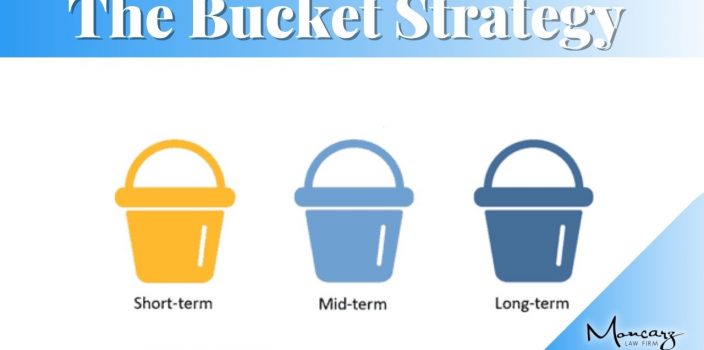
As a tax professional, easily the most common type of question I get is related to either making more money or saving more money. The two are nearly synonymous, but, of course, to save it, you have to make it.
Unfortunately, a lot of “makers” aren’t very good “savers.”
I want to share an “old school” method that has recently undergone a bit of a revival in some circles. It’s called the Bucket Strategy.
Basically, you think about your ENTIRE (pre-tax) income and how you’ll assign it to one of three “buckets” – Immediate, Intermediate, and Long Term.
In that Immediate bucket, you’ll place (or budget) the money you’ll have to spend immediately. The taxes that are paid by your employer, your 401(k) contributions, your monthly bills, gas, food, and so on.
Get this money dialed in to the penny because ALL of it should be spent each month – but not a dime more.
Your Intermediate bucket is the part of your budget where annual bills and expenses will be paid from. This might be property taxes, vacation, birthday, or Christmas savings, or any yearly bills you might have – certifications for your job your employer doesn’t pay, even home, auto, and life insurance (those can be paid monthly, too, but you’ll often realize significant savings by paying it annually) or income taxes you know will be due. Your Intermediate bucket will double as your emergency fund 90% of the time.
Lastly, there’s your Long Term bucket.
This money is sacrosanct. It’s retirement funding, your kid’s college money, or the money for the house’s down payment. The idea behind this bucket is to place it into some type of investment where it can generate income through interest because it will be in place for a while – think from 5-20 years. This isn’t necessarily all stuffed into a 401(k), either – it could be an overfunded life insurance policy, real estate, or even precious metals.
Whatever it is, and wherever it is, you want it to be at least a little bit of a challenge to access and turn into cash.
Now, likely the first thing you’ll learn when you begin to use this system is you’ve got waaaaay too many bills to pay. Take a deep breath and stay focused! More importantly, recognize that, in the long term, creating and following this discipline will allow you to have more saved than you could possibly do any other way.
Just as importantly, remember, my team and I are always available to help you look for more ways to save and to “find” money in your paycheck. When you really begin using the Bucket Strategy in full force, though, you’ll be amazed at how easy it is to really begin saving and investing a substantial amount.



